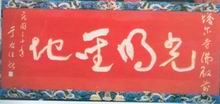| Manjusri Bodhisattva
Hall
Manjusri Hall
is also called Nine-Chamber Hall. In 1592 (Ming Dynasty), funded
by farmers and graziers, a Three-Buddha (of Past, Present and
Future) Hall was built on the site of Nine-Chamber Hall. In 1626,
it was rebuilt and enlarged. In 1734 (Qing Dynasty), required
by 7th Dalailama, the 24th Chief of Ta’er Monastery repaired and
rebuilt it into the current Manjusri Hall covering area of 595㎡.
Lying in the north of Sermon Hall, the two-tier hall is combined
Han and Tibetan art with three gilded vase on the ridge of its
roof.

There are three parts from north to south on the top tier.
The three chambers on the northern side are enshrined with statues
of Lion Roar Buddha in center-left, Zunsheng Warrior Buddha and
Baisangai Buddha. Wealth Fairy with amiable face and bright eyes
and Music Fairy holding lute gracefully are the prominent painting
sculptures.
In the three chambers in the middle are statues of Manjusri Bodhisattva
made by Quexi Losangsinin and Bodhisattva with powerful hands.
They are the valuable sculptures in Ta’er Monastery and the symbol
of wisdom, humanity and bravery.
A three-meter high stone column is displayed in one of the three
chambers. It is smeared with ghee and has a footprint that is
said to be left by Zongkapa’s teacher when he carried water. Another
version is that it was left by Zongkapa when he was a child. Although
it is absurd, the stone is regarded as holy stuff by Zang Nationality.

In the three chambers on the southern side are enshrined with
statues of Zongkapa, two ancient Indian Mitzvah Supervisors, six
Buddhist experts of ancient India: Lonshu, Wuzhu, Shengtian, Qinshi,
Chenna and Fachen, two Zongkapa’s students Jiacaojie and Kezhujie,
first Panchen and 4th Dalailama. There are statues of Warriors
protecting Buddha and picture of the spot where Yellow Wing led
by Zongkapa and Red Wing debated. There are two inscribed horizontal
boards hung over the gate of the Hall.
page
up page down
|



